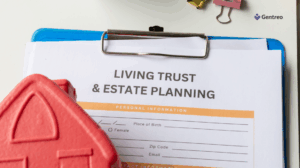
Planning for the future involves many important decisions, including how you want to handle end-of-life arrangements. One key aspect of this planning is choosing between burial and cremation. Cremation has grown in popularity for many families due to its affordability and flexibility compared to traditional burial. However, there are still costs associated with the process that can vary based on a variety of factors.
By understanding the costs of cremation and planning ahead, you can ensure that your wishes are known and that your family is prepared when the time comes. The Gentreo Digital Vault is an excellent tool for securely storing and sharing your cremation plans with family members, so they know exactly what you want without any confusion or disputes.
What Are the Average Costs of Cremation?
Cremation can cost anywhere between $1,000 and $5,000, depending on a variety of factors such as location, the services chosen, and additional options. While the process itself is generally less expensive than a traditional burial, there are still costs to consider. Here’s a breakdown of the major expenses you might encounter:
- Direct Cremation
Direct cremation is the simplest and most cost-effective option, where the body is cremated shortly after death without a formal viewing or funeral service. This typically costs between $1,000 and $2,500. Direct cremation appeals to those who prefer simplicity or want to allocate funds elsewhere, such as a celebration of life service at a later time. - Cremation With a Funeral Service
If you wish to have a funeral service with cremation, the costs will rise as this includes fees for embalming, body preparation, the use of a funeral home for services, and potentially purchasing a casket. This option can cost between $2,500 and $5,000 depending on the level of service and whether there is a graveside ceremony or wake involved. - Additional Costs
Many families opt to purchase a cremation urn, which can range from $50 to several thousand dollars depending on the material and design. Other optional expenses include memorial services, obituaries, and cemetery plots for cremation burials or columbarium spaces for urns. Keep these additional costs in mind as you budget for cremation.
Factors That Influence Cremation Costs
Understanding the factors that influence the cost of cremation can help you make informed decisions when pre-planning your arrangements. The following are key aspects that affect the overall cost:
- Geographical Location
Cremation costs can vary widely depending on where you live. Major metropolitan areas typically have higher service fees, while rural locations may offer more affordable options. It’s a good idea to compare quotes from local providers to find one that fits your budget. - Cremation Provider
Funeral homes and cremation-specific providers may offer different pricing models. Funeral homes might provide bundled packages that include memorial services, while cremation providers may offer more flexible options where you can pick and choose services. Researching various options can help you determine the best value for your needs. - Additional Services
If you plan to have a traditional funeral service alongside cremation, you will likely need to budget for embalming, the use of a viewing room, and other associated fees. Optional add-ons like memorial videos, floral arrangements, and professional speakers can also add to the overall cost. Consider what’s most important to you when choosing these services. - Memorial Items
Many families choose to purchase a special urn or keepsake items to remember their loved ones. Urns come in a wide range of materials and styles, from simple wood or metal designs to custom, artistic pieces. Keep in mind that memorial jewelry, cremation artwork, or burial in a cemetery plot can further increase costs.
Why Is Cremation More Affordable Than Burial?
Cremation is generally more affordable than traditional burial due to the elimination of certain costs, such as the purchase of a cemetery plot, a headstone, and a casket. In a burial, these items can add thousands of dollars to the overall cost. By comparison, cremation allows families more flexibility, particularly with the option of direct cremation, which minimizes expenses while still providing a meaningful way to honor a loved one.
Additionally, cremation often appeals to those who prefer environmentally-friendly practices. By avoiding land use and the chemicals involved in the embalming process, cremation offers an eco-conscious option that aligns with the values of many families today.
Pre-Planning Your Cremation Arrangements
Planning your cremation arrangements in advance can offer peace of mind for both you and your loved ones. When you take the time to pre-plan, you have the ability to lock in current prices, make your wishes known, and prevent family members from being burdened with tough decisions in a time of grief.
Here are a few key reasons why pre-planning makes sense:
- Cost Control: The cost of funeral services and cremation is likely to increase over time. Pre-arranging allows you to lock in today’s prices, avoiding future price hikes.
- Clarifying Your Wishes: Documenting your cremation preferences removes the uncertainty about what you would have wanted, ensuring that your loved ones are aware of your choices.
- Reducing Family Stress: By taking care of the details ahead of time, your family won’t have to make emotional or financial decisions during an already difficult period.
While you’re planning these arrangements, it’s essential to store your preferences in a place where your loved ones can easily access them. That’s where the Gentreo Digital Vault comes in.
Storing and Sharing Cremation Plans in the Gentreo Digital Vault
Gentreo offers a simple, secure solution for storing all of your estate planning documents, including your cremation arrangements, in one central location. Here’s how the Gentreo Digital Vault can help:
- Centralized Document Storage: Whether it’s your will, healthcare directives, or cremation preferences, the Gentreo Digital Vault keeps all your important documents organized and accessible in one secure place.
- Easy Sharing Options: You can share access to specific documents with trusted family members, friends, or executors. You can choose whether to share your entire Digital Vault or only certain files, depending on your preferences.
- Accessible Anytime, Anywhere: Your loved ones can access the Gentreo Digital Vault from anywhere, whenever they need it. This ensures they’ll have the necessary information, even in urgent or unexpected situations.
Storing and sharing access to your cremation plans in the Gentreo Digital Vault helps ensure your family has quick, easy access to your wishes when the time comes. It also alleviates stress and confusion, as your loved ones won’t have to search for paperwork or guess about your preferences.
Why Choose Gentreo for Your Estate Planning?
At Gentreo, we understand how crucial it is to make estate planning accessible and easy. With Gentreo, you can not only store your cremation preferences but also create and securely store essential documents like your will, healthcare proxy, and powers of attorney. Everything is stored in one place, ready to be shared with your family when they need it most.
Choosing cremation is just one part of the broader estate planning process. By pre-planning and securely storing all of your important documents in the Gentreo Digital Vault, you are ensuring that your family is well-prepared, reducing emotional strain and the potential for disputes.
To learn more about how Gentreo can help you plan for the future and store your cremation arrangements, visit www.gentreo.com. Start your estate planning journey today to secure peace of mind for yourself and your loved ones.
Don’t wait until it’s too late; start your estate planning journey with Gentreo today. By doing so, you’ll not only protect your loved ones but also gain the peace of mind that comes with knowing your legacy is secure. Click HERE to join now.
This article is for informational purposes only and should not be considered legal advice. Consult with a qualified attorney or estate planning professional for personalized guidance.










